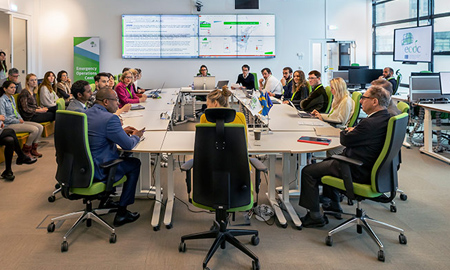Preparedness and response
 The EU Early Warning and Response System (EWRS) is hosted by ECDC on behalf of the European Commission and serves as a key tool for supporting the EU-level response to serious cross-border threats to health. During 2022, ECDC maintained the function of EWRS and implemented further improvements to the platform, according to the needs of the European Commission and Member States. Development focused on the selective exchange module for contact tracing and support of medical evacuation.
The EU Early Warning and Response System (EWRS) is hosted by ECDC on behalf of the European Commission and serves as a key tool for supporting the EU-level response to serious cross-border threats to health. During 2022, ECDC maintained the function of EWRS and implemented further improvements to the platform, according to the needs of the European Commission and Member States. Development focused on the selective exchange module for contact tracing and support of medical evacuation.
In addition, the EpiPulse platform, launched in 2021, was used extensively to facilitate collection of data and exchange of experts' experiences in communicable disease outbreaks. During 2022, the production of the Communicable Disease Threat Report was integrated into EpiPulse. Furthermore, the Whole Genome Sequencing (WGS) module was developed. ECDC also coordinated the harmonisation of investigations into multi-country public health events and threats and made protocols available to Member States to guide contact tracing activities.
Public Health events (PHE)
During 2022, ECDC maintained the Emergency Operations Centre (EOC) at the highest alert level. During the spring and summer 2022, ECDC’s Emergency Operations Centre supported three ongoing PHEs simultaneously (the COVID-19 pandemic, an outbreak of hepatitis of unknown origin in children and the mpox multi-country outbreak).
The COVID-19 PHE was gradually de-escalated in 2022. ECDC’s workload related to the ongoing COVID-19 pandemic remained high throughout the year. However, the number of events/urgent requests requiring immediate response has now significantly decreased and the focus has shifted towards longer-term monitoring, prevention and control of SARS-CoV-2. T
During 2022, ECDC published several rapid risk/outbreak assessments (RRA/ROA) to support Member States and the European Commission in their preparedness and response to public health events. A total of 14 rapid risk assessments and threat assessment briefs were published in 2022; six were related to ongoing PHEs and eight to other outbreaks, four of which were joint ECDC-EFSA rapid outbreak assessments as part of the ‘One-Health’ approach in response to cross-border foodborne threats.
Another activity in which the Agency was engaged was the collating of lessons identified from the COVID-19 pandemic. An internal exercise, collecting lessons from ECDC’s experts involved in supporting the work under the COVID-19 PHE, was followed by a collection and review of reports on COVID-19 lessons learned, published by various countries. In addition, six country visits were undertaken between May and September 2022 to discuss lessons identified at country level. Finally, an expert consultation meeting was organised with the Member States in September 2022, with the participation of over 70 EU/EEA experts, focusing on lessons learned from the COVID-19 pandemic.
In response to public health events, the Centre organised several field deployments. ECDC infectious disease experts and communication officers were deployed to Poland (10 deployments) and Romania (one deployment) in support of national authorities and WHO, to assist refugees from the Ukraine following Russia’s invasion in February 2022. Several infectious disease experts were also deployed to Uganda to support the local DG ECHO office and EU delegation during an Ebola virus disease outbreak.
In collaboration with DG SANTE, ECDC developed service-level agreements and plans for joint ECDC/DG ECHO field deployments for preparedness and response assignments, both inside and outside the EU. ECDC also prepared the arrangements for the operationalisation of the EU Health Task Force and the creation of its governance bodies, prior to the new ECDC mandate entering into force in December 2022
In collaboration with EUROPOL, ECDC organised the fourth ‘Biorisk awareness and mitigation training’ (BAM2022) in Valencia (Spain), the first since the pandemic. The course was organised with a regional approach, involving countries according to their geographic location, to facilitate the establishment of ‘preparedness partnerships’ between neighbouring countries. A total of 55 participants from 17 EU/EEA countries, and from Georgia and Moldova, and 17 facilitators/speakers/self-funded observers from different institutions attended/facilitated the training.